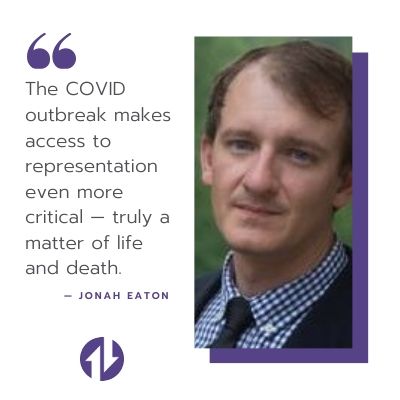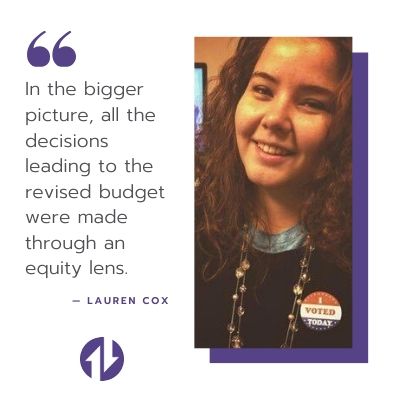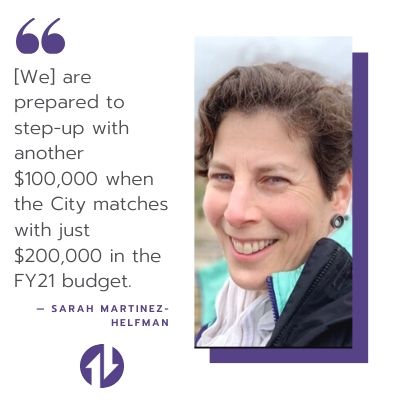Restoring this $200K to the budget for FY21 could literally save lives, say nonprofit leaders
 May 15, 2020
Category: Featured, Long, Purpose
May 15, 2020
Category: Featured, Long, Purpose
What is a life worth? For $200,000 — less than the median cost of purchasing a single home in Philadelphia — Mayor Jim Kenney could fund the City’s part of a private-public partnership program that can save lives.
Instead, the City’s funding for the Pennsylvania Immigrant Family Unity Project (PAIFUP), the pilot public defender program for immigrants facing deportation, has quietly been zeroed out of the mayor’s proposed FY21 budget.
In July 2019, Philadelphia became one of 18 communities that joined the Vera Institute of Justice’s Safety and Fairness for Everyone (SAFE) Network. PAIFUP was launched as a public private partnership with a budget of $300,000 in FY20 and combined funding from the City, the Samuel S. Fels Fund, and a one-time, catalyst grant from the Vera Institute.
Although the City’s funds weren’t unlocked until February/March 2020, PAIFUP has been in operation since October 2019, and according to Jonah Eaton, a supervising attorney at the Nationalities Services Center, one of the legal service providers carrying out the day-to-day work of PAIFUP, the program has accomplished a lot in that time.
“Since October 2019 we have consulted [with] 120 people, and have represented 38 people — attending 40 hearings and gotten 14 people released,” Eaton told Generocity via email. “In one case we intervened relatively late in the process on behalf of a legal permanent resident who has lived in the U.S. since childhood, and showed the court that the government had made a legal error and did not actually have the right to deport him. The court dismissed the proceedings and he is now safe at home in Philadelphia. If he had gone to his final hearing without a lawyer, he almost certainly would have been deported because his case turned on a complicated legal argument.”
“I think the first thing that has to be emphasized is that this project begins to address a profound human rights failure in this country, the lack of guaranteed assistance of counsel for noncitizens the government is trying to deport,” Eaton added. “This is especially true of noncitizens who the government has decided to detain during their proceedings. Most of the people deported out of the York Immigration Court, which handles detained cases in PA, do not have the assistance of a lawyer — and deportation can be a life or death proposition.”
The stakes of the work were already high, but have only gotten higher since COVID-19.
“The COVID outbreak makes access to representation even more critical — truly a matter of life and death,” Eaton said, “because prisons are perfect petri dishes of infection, both within the facility, and for the surrounding communities. In a prison, social distancing is impossible and so getting people out of ICE detention really is a public health issue as well.”
According to NPR‘s reporting from the end of April, COVID-19 testing “has been limited among detainees being held by Immigration and Customs Enforcement, which often contracts with county jails for space. Overall, about 2% of 32,000 immigrants detained by ICE have been tested. When they are tested, about 50% are coming back positive.”
Erika Guadalupe Núñez, the executive director of the Latinx immigrant advocacy nonprofit, Juntos, says the impacts on detainees are even greater than that.
“Before the start of this public health crisis, adults and children detained were already dying in detention,” she told Generocity via email. “In just the last week alone, two people have died from COVID-19 in detention and ICE has tested just 700 people out of the 30,000 held across the country — with a shocking 60% testing positive for the virus. Access to universal representation right now is literally a lifeline, particularly for our immigrant families who are disproportionately impacted by job loss and are unable to secure legal support for their loved ones.”
“In cutting PAIFUP from the budget,” Núñez added, “we are setting the stage for a rise in deportations, family separation, and trauma for family members left behind, all of which will have its own unique cost for our city. Most importantly, we will see an increase in illnesses and deaths from COVID-19 by those left vulnerable in institutions characterized by their squalid conditions and inefficient medical care.”
Lauren Cox, the deputy communications director from the Office of the Mayor, told Generocity via email that the decision to cut PAIFUP from the proposed FY21 budget was part of a set of difficult budgetary decisions.
“While we still believe the universal defense pilot and other programs we’ve had to reduce or cut are valuable,” Cox said, “we had to find almost $650 million in budget balancing actions in one year.”
But in a proposed budget that deals in multimillion dollar increments, and makes increases of 127% and 241% to certain offices and services, along with 100% cuts to others (see the breakdown in this visualization from the Office of the Controller), it’s hard to parse the small-potatoes funding for PAIFUP as having the ability to tip the budget’s balance one way or another.
Asked directly about whether the cut represented a step back from the City’s strong and proactive immigration stance, Cox pointed to the proposed budget’s preservation of staffing in the Office of Immigrant Affairs and language access funding as evidence that the administration continues to advance policy and program priorities for immigrants.
“In the bigger picture, all the decisions leading to the revised budget were made through an equity lens,” Cox said. “The budget intentionally aims to limit the impact of service delays or cuts on people of color and other marginalized communities who are disproportionately impacted by the virus and already suffering from decades of systemic inequality.”
But, of course, out-of-status immigrants and those who live in mixed-status households are among those disproportionately impacted by the virus and its attendant economic crash (and many of them have been living here for decades). According to a Pew report from 2018, “nearly 1 in 5 Philadelphians in the labor force in 2016 was an immigrant, with the biggest number working in service jobs in the health care and education, hospitality, and retail sectors” — precisely the industries hardest hit by the pandemic.
And while that same Pew report calculated that only a quarter of the total immigrant workforce in Philadelphia was undocumented (50,000 individuals according to 2014 figures), there is no denying that, without recourse to federal or state assistance and subject to overcrowded, inhumane and unhealthy conditions if they are detained, the community of out-of-status immigrants are among our grievously impacted neighbors.
“PAIFUP is a critical component of the City’s effort to protect our neighbors during this health crisis and its funding should be restored,” Eaton said. “Especially amid the COVID-19 pandemic, we need Philadelphia leaders to step up with bold leadership and moral clarity to protect the most vulnerable among us.”
Sarah Martinez-Helfman, the president of the Fels Fund, agrees.
“We heard the City when they said that equity, health, safety and public private partnerships would be central to their budget decisions,” she told Generocity via email. “We already made a $100,000 grant in support of this project and are prepared to step-up with another $100,000 when the City matches with just $200,000 in the FY21 budget.”
Looking at the proposed budget overall, PAIFUP’s part is very modest, but it has an outsized moral dimension.
“I mean these are people who have been ripped from their families by ICE and are now facing the prospect of death in detention,” Martinez-Helfman said. “How can we collectively let this happen? Where is our humanity?”
Project
Office of Immigrant and Multicultural AffairsTrending News













